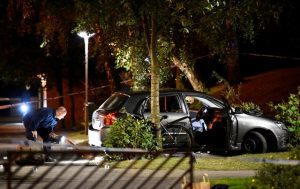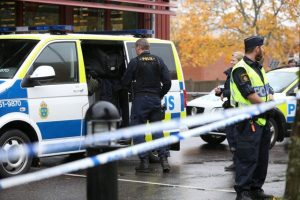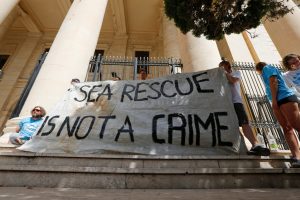
By Simon Johnson and Johan Ahlander
STOCKHOLM (Reuters) – A surge in gang violence has stirred anti-immigration sentiment before an election in Sweden, putting a far-right party on course for big gains in one of Europe’s most liberal countries.
Dozens of people have been killed in the past two years in attacks in the capital Stockholm and other big cities by gangs that are mostly from run-down suburbs dominated by immigrants.
In the latest bloodshed, three men were shot dead and three were wounded outside an internet cafe in the city of Malmo on June 18. A fourth man was shot dead days later and another man survived because he was wearing a bullet-proof vest.

FILE PHOTO: Police technicians examine the car which people who were injured were traveling in, after a shooting in southern Malmo, Sweden September 25, 2016. TT News Agency/Emil Langvad via Reuters/File Photo
With public calls growing for tougher policies on crime and immigration, support has risen for the Sweden Democrats, a party with neo-Nazi roots that wants to freeze immigration and to hold a referendum on Sweden’s membership of the European Union.
Their worried mainstream rivals have started moving to the right on crime and immigration to try to counter the Sweden Democrats’ threat in the Sept. 9 election. But so far, they are playing into the hands of the far-right.
“Right now they (mainstream parties) are competing over who can set out the most restrictive policies,” said Deputy Prime Minister Isabella Lovin, whose Green Party is part of a minority government led by the Social Democratic Party.
“It clearly benefits the Sweden Democrats.”
Opinion polls put the Sweden Democrats on about 20 percent support, up from the 13 percent of votes they secured in the 2014 election and the 5.7 percent which saw them enter parliament for the first time in 2010.
The Sweden Democrats’ rise on the back of anti-immigration sentiment mirrors gains for right-wing, populist and anti-establishment parties in other European countries such as Italy, France, Germany, Poland, Hungary, Slovenia and Austria.
Immigration has risen back up the political agenda since far-right parties entered coalition governments in Austria and Italy, and will be discussed at a summit in Brussels this week.
Though the Sweden Democrats are unlikely to win power, the growing popularity for a party opposed to the EU is a concern for Brussels although Swedes broadly support EU membership, polls show.

FILE PHOTO: Police officers stand guard at a cordoned area after a masked man attacked people with a sword at a school in Trollhattan, western Sweden October 22, 2015. REUTERS/Bjorn Larsson Rosvall/TT News Agency/File Photo
BACKLASH
Five years ago, Sweden saw itself as a “humanitarian superpower” that generously welcomed migrants, many of them fleeing conflict in the Middle East and Africa.
But as in Germany, where Chancellor Angela Merkel’s government has been cracking under pressure from her coalition partners to tighten immigration curbs, Sweden’s government now faces a backlash over the scale of immigration.
About 400,000 people have sought asylum in the wealthy Scandinavian country of 10 million since 2012, and it took in 163,000 asylum seekers in 2015 alone. Some voters fear schools, hospitals and welfare services cannot cope, and Sweden’s reputation for tolerance and social equality is threatened.
The Sweden Democrats still trail the Social Democratic Party but has overtaken the main opposition Moderates in many polls. All mainstream parties have ruled out working with them.
But they could emerge from the election as kingmakers, and a strong election showing could force the next government to take their views into consideration when shaping policy.
Their policies include a total freeze on asylum seekers and accepting refugees only from Sweden’s neighbors in the future. They also want tougher penalties for crime and more powers for police, and say tax cuts and higher spending on welfare could be funded by cutting the immigration budget.
Jimmie Akesson, the leader of the Sweden Democratic party, has described the situation as “pretty fantastic”.
“We are dominating the debate even though no one will talk to us,” he told party members.
RUTHLESS CRIMINAL UNDERCLASS
There were 129 shootings in Stockholm in 2017. Nineteen people were killed in the attacks, almost twice as many as in 2016, according to official figures.
In Malmo, where about 45 percent of the 330,000 inhabitants have an immigrant background, police say three or four gangs are operating. Swedish media say nine people have been shot dead in the city this year after 21 in the previous two year-period.
A 2017 police report into Sweden’s most deprived areas pointed to a heavily armed and ruthless criminal underclass.
All the areas identified by police are socially deprived suburbs with large immigrant populations, places where poverty and long-term youth unemployment are big problems.
Among these is the Stockholm suburb of Rinkeby, where two men walked into a pizzeria packed with families in January and shot a man dead in what police said was a gang killing.
When it was built in the 1970s, Rinkeby was a symbol of modernity, part of what became known as Sweden’s Million Homes project to replace run-down inner-city slums with clean, well-planned suburbs with their own schools, shops and healthcare facilities.
With ninety-one percent of its 16,000 inhabitants born abroad or to parents born outside Sweden, only half of them working, the area is now synonymous with failed integration, unemployment and social exclusion.
Police say people in Rinkeby live in fear of a group known as the Death Patrol gang.
“A few individuals have kept an entire neighborhood terrified,” said Mohamed Nuur, 26, a local Social Democrat politician. Witnesses of the pizzeria shooting were afraid to testify against the suspects, he said.
Rinkeby was one of several suburbs in northern Stockholm hit by riots in 2013 which fueled debate about how Sweden is coping with youth unemployment and the influx of immigrants, issues raised by urban violence in France in 2005 and Britain in 2011.
“RIGHT-WING PATH”
Many Swedes were horrified in early 2017 when U.S. President Donald Trump linked immigration to rising crime in Sweden, but an increasing number now agree with him.
The Sweden Democrats have succeeded in linking the two in the minds of many voters, even though official statistics show no correlation between overall levels of crime and immigration.
Sweden has one of the highest levels of lethal gun violence in Europe, World Health Organisation data showed. But while the number of foreign-born citizens has risen for decades, murder rates are roughly flat.
The government denies it has lost control but Prime Minister Stefan Lofven has not ruled out sending the military into problem areas.
Moving to the right, he has tried to deal with the threat posed by the Sweden Democrats by saying immigration – down to 26,000 in 2017 – should halve from last year’s level.
The government has also proposed tougher punishments for gun crimes and sexual assaults, wants to stop financial support for undocumented foreigners, put more of those whose identity is unclear in holding centers and accelerate repatriation of failed asylum seekers.
The Moderates have also toughened their stance on crime and immigration, promising a crackdown on welfare for asylum seekers and a ban on begging. Both main parties say Sweden will not return to liberal asylum rules suspended in 2015.
“Sweden is going down a more right-wing path,” said Nick Aylott, a political scientist at Sodertorn University said. “It is almost impossible to avoid according some sort of influence to a party with around 20 percent of the vote.”
(Editing by Timothy Heritage)












